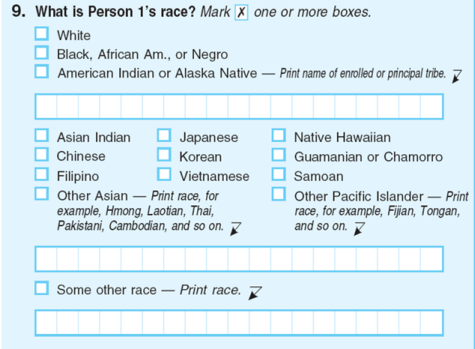 What is your race? The U.S. Census Bureau asks this question of every U.S. household, but the menu of options offered may feel limiting to some.
What is your race? The U.S. Census Bureau asks this question of every U.S. household, but the menu of options offered may feel limiting to some.
On the 2010 census form, in addition to boxes marked “white,” “black or African Am. Or Negro” or “American Indian or Native Alaskan” or one of several Asian options, respondents have the option to select a box called “some other race”—and to write in a response in a box below.
 According to a new Census report released last week, about one-third of the 47.4 million self-identified Hispanics chose “some other race” when describing their racial identity. Among them, 44.3% wrote in Mexican, Mexican American or Mexico in the box provided. An additional 22.7% wrote in Hispanic or Hispano or Hispana as their race and another 10.0% wrote in Latin American or Latino or Latin.
According to a new Census report released last week, about one-third of the 47.4 million self-identified Hispanics chose “some other race” when describing their racial identity. Among them, 44.3% wrote in Mexican, Mexican American or Mexico in the box provided. An additional 22.7% wrote in Hispanic or Hispano or Hispana as their race and another 10.0% wrote in Latin American or Latino or Latin.
Latinos are not the only group of Americans who utilize the “some other race” category on the census form—but they are the most likely to do so. In 2010, 6.2% of Americans selected “some other race,” up from 5.5% in 2000. Among all those who answered the race question this way in 2010, 96.8% were Hispanic, little changed from 2000. In addition to the race question, the 2010 census included a separate question about Hispanic origin. It is currently the only ethnic category included in the census and has been asked of all households on census forms since 1980.
 The new Census Bureau report also detailed “some other race” responses by Hispanic origin groups. About 43.4% of Guatemalan origin Hispanics selected the category, as did 42.9% of Salvadorans and 37.7% of Hondurans, the three highest shares among Hispanic origin groups. By contrast, just 5.2% of Cubans, 8.1% of Argentineans and 8.9% of Uruguayans selected “some other race.”
The new Census Bureau report also detailed “some other race” responses by Hispanic origin groups. About 43.4% of Guatemalan origin Hispanics selected the category, as did 42.9% of Salvadorans and 37.7% of Hondurans, the three highest shares among Hispanic origin groups. By contrast, just 5.2% of Cubans, 8.1% of Argentineans and 8.9% of Uruguayans selected “some other race.”
These findings are consistent with Pew Research Center surveys on Latinos and their views of their identity. Most prefer to be identified by their country of origin, such as Mexican, Dominican or Guatemalan. When it comes to reporting their race, about half of Latinos in our surveys choose “some other race” or volunteer “Hispanic or Latino” as their race. Latinos also largely express no preference for the pan-ethnic terms “Hispanic” or “Latino.” But among those with a preference, “Hispanic” is preferred over “Latino” by a two-to-one margin.
The “some other race” option in the census form’s race question was never intended to be a category selected by so many respondents. The category was added to the 1980 census form to capture the small numbers of people who did not select one of the official race categories. But since then, it has grown to become the third-largest race category in the census.
The Census Bureau is currently researching how to reverse the growing percentage of Americans who choose “some other race,” including options combining all race and ethnic options into a single question. In focus groups, Americans have said they’re unsure of how to identify themselves on census forms, which has partly led to growth in the use of the “some other race” category. Census racial and ethnic data help determine how congressional districts are drawn, how $400 billion in federal aid is distributed and enforcement of civil rights laws.
The National Institute for Latino Policy and many scholars have raised the possibility that the use of the “some other race” category by Hispanics is a “legitimate response to U.S. definitions of race that do not apply to the experience (of) many Latinos,” rather than a sign that Hispanics are struggling to answer the question.




